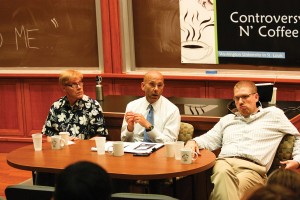News
Students, faculty talk Greek at panel
Psychology lecturer James Reid, Director of Greek Life Office and Executive Director of Campus Life Mike Hayes and anthropology professor Peter Benson discuss the status of Greek Life on campus.
For most students, Greek life happens outside the classroom, but on Tuesday night, professors, students and administrators gathered in Wilson 214 to discuss the role of the Greek system on campus.
Sponsored by Controversy N’ Coffee, a Student Union group entering its fourth year, this discussion panel—titled “It’s all Greek to me: A debate concerning Greek life on campus”—aimed to create critical awareness of a topic already familiar to students, according to the group’s president, junior Mariana Oliver.
“Greek life is a very big thing on campus, and people have big opinions on it, but a lot of times, these opinions are presented in casual conversations between kids. We thought it would be interesting to start the year with intellectual and sociological perspectives from the Wash. U. community, especially for freshmen, who may not know much about Greek life yet,” Oliver said.
The panel consisted of Peter Benson, an assistant professor of anthropology; Mike Hayes, executive director of campus life and director of the Greek Life Office; and James Reid, a senior lecturer in psychology. For thirty minutes, the panelists discussed topics posed by moderator Tim Bono, a graduate student in psychology, before taking questions from the audience.
Over the course of the discussion, Benson, Hayes and Reid delved into issues ranging from the sanctification of alcohol by the commercial media to the diversity observed in Washington University fraternities and sororities.
Benson, who attended Vanderbilt University as an undergraduate, discussed the ways in which the Greek community at Washington University differs from his own college experience, where fraternities were often racially exclusive. He spoke about the contributions of any form of social allegiance to liberal democracy but voiced concerns about the potential for a lack of “critical self-reflection” as it applies to Greek life.
“As an anthropologist, I believe that saying people in the Greek system are self selecting is like saying that people in the military are self selecting. There are institutionalized boundaries that are supported by [a] university and enable certain kinds of social groupings to endure over a very long period of time,” Benson said.
All three panelists acknowledged the positive nature of Greek values—loyalty, honor and service—but they also acknowledged the potential for stereotypes and misbehavior to tarnish these ideals.
“At it’s worst, it’s bad stuff,” Hayes said. “A lot of times, it depends on the Chief Strom police reports, whether I can tell if [Greek Life] is a good experience or not.”
Hayes, who worked as an administrator at the University of Maryland before coming to Washington University, said that the Greek experience is fundamentally different for students here than it is for those at larger state schools.
“At Wash. U., Greek often is not the only identity a student has. My concern about Wash. U. is how [students] make meaning of all of their extracurricular experiences, and I try to help them find the intersections—where their Greek values inform their values about academics and community service and whatever else they may do on campus,” Hayes said.
Though the panel was scheduled for the same night as Greek Sing, a Greek Week event, it was well-attended by both Greek and non-Greek students.
“I think there was apprehension by students overall that this would be an anti-Greek event. In reality, it was a discussion among fair-minded people,” said sophomore Peter Birke, Coffee N’ Controversy’s external vice president. “For me, as a member of the Greek community, it was a process of critical self-reflection.”
Birke said that the group’s most well-attended discussions have been about topics that relate directly to the campus.
“With every convention on campus, you have to ask yourself why it’s here, what purpose it’s serving. That’s what we’re here to do.”

